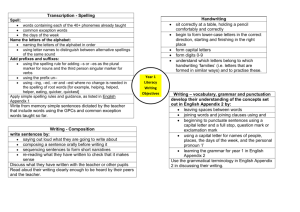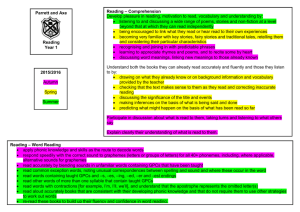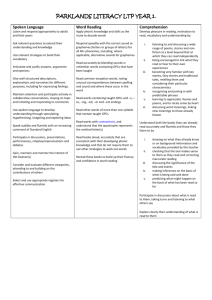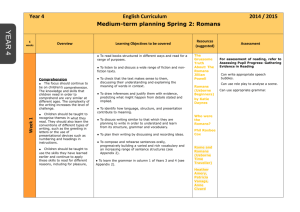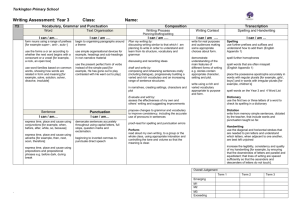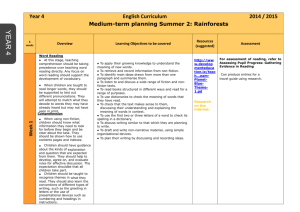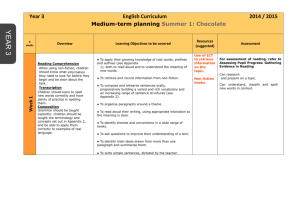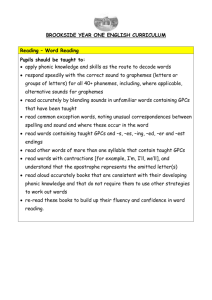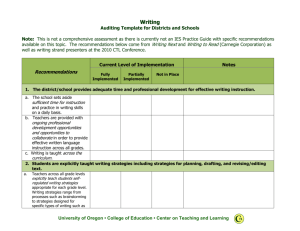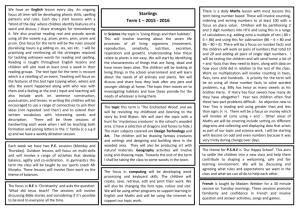File
advertisement
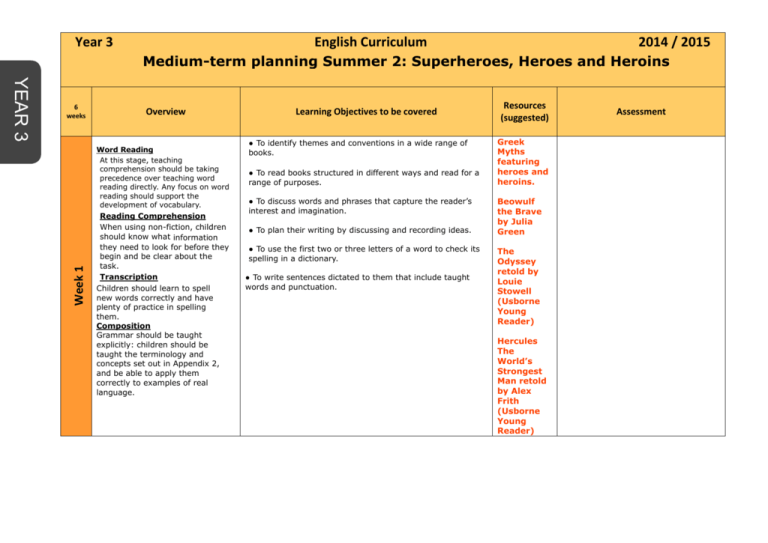
Year 3 English Curriculum 2014 / 2015 Medium-term planning Summer 2: Superheroes, Heroes and Heroins Overview Word Reading At this stage, teaching comprehension should be taking precedence over teaching word reading directly. Any focus on word reading should support the development of vocabulary. Week 1 YEAR 3 6 weeks Reading Comprehension When using non-fiction, children should know what information they need to look for before they begin and be clear about the task. Transcription Children should learn to spell new words correctly and have plenty of practice in spelling them. Composition Grammar should be taught explicitly: children should be taught the terminology and concepts set out in Appendix 2, and be able to apply them correctly to examples of real language. Learning Objectives to be covered ● To identify themes and conventions in a wide range of books. ● To read books structured in different ways and read for a range of purposes. ● To discuss words and phrases that capture the reader’s interest and imagination. ● To plan their writing by discussing and recording ideas. ● To use the first two or three letters of a word to check its spelling in a dictionary. ● To write sentences dictated to them that include taught words and punctuation. Resources (suggested) Greek Myths featuring heroes and heroins. Beowulf the Brave by Julia Green The Odyssey retold by Louie Stowell (Usborne Young Reader) Hercules The World’s Strongest Man retold by Alex Frith (Usborne Young Reader) Assessment Reading Comprehension The focus should continue to be on children’s comprehension. The knowledge and skills that children need in order to comprehend are very similar at different ages. The complexity of the writing increases the level of challenge. Week 2 Children should be taught to recognise themes in what they read. They should also learn the conventions of different types of writing, such as the greeting in letters or the use of presentational devices such as numbering and headings in instructions. Children should have guidance about the kinds of explanation and question that are expected from them. They should help to develop, agree on, and evaluate rules for effective discussion. The expectation should be that all children take part. Composition Grammar should be taught explicitly: children should be taught the terminology and concepts set out in Appendix 2, and be able to apply them correctly to examples of real language. Transcription Children should be using joined handwriting throughout their independent writing. Handwriting should continue to be taught, with the aim of increasing the fluency with which children are able to write down what they want to say. This, in turn, will support their composition and spelling. ● To identify main ideas drawn from more than one paragraph and summarise them. ● To increase familiarity with a wide range of books and retell some of these orally. ● To identify themes and conventions in a wide range of books. ● To plan their writing by discussing and recording ideas. ● To use the first two or three letters of a word to check its spelling in a dictionary. ● To write sentences dictated to them that include taught words and punctuation. ● To compose and rehearse sentences orally, progressively building a varied and rich vocabulary and an increasing range of sentence structures (see Appendix 2). For assessment of reading, refer to Assessing Pupil Progress: Gathering Evidence in Reading Can spell words of Greek origin containing ‘ch’. Can identify elements of a Greek myth and retell it. Can dramatically capture the main events in a story. Week 3 Reading Comprehension The focus should continue to be on children’s comprehension. The knowledge and skills that children need in order to comprehend are very similar at different ages. The complexity of the writing increases the level of challenge. ● To identify main ideas drawn from more than one paragraph and summarise them. Children should be taught to recognise themes in what they read. They should also learn the conventions of different types of writing, such as the greeting in letters or the use of presentational devices such as numbering and headings in instructions. ● To use the perfect form of verbs to mark relationships of time and cause. Children should have guidance about the kinds of explanation and question that are expected from them. They should help to develop, agree on, and evaluate rules for effective discussion. The expectation should be that all children take part. Transcription Children should learn to spell new words correctly and have plenty of practice in spelling them. Dictionaries are not useful for children who cannot yet spell, since these children do not have sufficient knowledge of spelling to use them efficiently. Handwriting should continue to be taught, with the aim of increasing the fluency with which children are able to write down what they want to say. This, in turn, will support their composition and spelling. Composition Grammar should be taught explicitly: children should be taught the terminology and concepts set out in Appendix 2, and be able to apply them correctly to examples of real language. ● To ask questions to improve their understanding of a text. ● To read books structured in different ways and read for a range of purposes. ● To use a wider range of conjunctions and include more clauses in a sentence. ● To choose nouns or pronouns appropriately to avoid repetition. ● To draft and write non-narrative material, using simple organisational devices. ● To plan their writing by discussing and recording ideas. ● To compose and rehearse sentences orally, progressively building a varied and rich vocabulary and an increasing range of sentence structures (see Appendix 2). ● To assess the effectiveness of their own and others’ writing and suggest changes. ● To propose changes to grammar and vocabulary to improve consistency. ● To discuss writing similar to that which they are planning to write in order to understand and learn from its structure, grammar and vocabulary. ● To organise paragraphs around a theme. Fiction books and comic strips. For assessment of reading, refer to Assessing Pupil Progress: Gathering Evidence in Reading Can produce a fact file on a character. Can review and improve non- fiction. Reading Comprehension The focus should continue to be on children’s comprehension. The knowledge and skills that children need in order to comprehend are very similar at different ages. The complexity of the writing increases the level of challenge. Week 4 Children should be taught to recognise themes in what they read. They should also learn the conventions of different types of writing, such as the greeting in letters or the use of presentational devices such as numbering and headings in instructions. Children should have guidance about the kinds of explanation and question that are expected from them. They should help to develop, agree on, and evaluate rules for effective discussion. The expectation should be that all children take part. Transcription Children should continue to be supported in understanding and applying the concepts of word structure Children should be using joined handwriting throughout their independent writing. Handwriting should continue to be taught, with the aim of increasing the fluency with which children are able to write down what they want to say. Composition Grammar should be taught explicitly: children should be taught the terminology and concepts set out in Appendix 2, and be able to apply them correctly to examples of real language. They should understand how to place the apostrophe in words with regular plurals (such as girls’, boys’) and in words with irregular plurals (such as children’s). ● To indicate grammatical and other features by using and punctuating direct speech. ● To plan their writing by discussing and recording ideas. ● To use the first two or three letters of a word to check its spelling in a dictionary. ● To write sentences dictated to them that include taught words and punctuation. ● To compose and rehearse sentences orally, progressively building a varied and rich vocabulary and an increasing range of sentence structures (see Appendix 2). ● To assess the effectiveness of their own and others’ writing and suggest changes. ● To use and understand the grammatical terminology in Appendix 2 accurately and appropriately when discussing their writing and reading. ● To discuss writing similar to that which they are planning to write in order to understand and learn from its structure, grammar and vocabulary. Fiction books and comic strips. For assessment of reading, refer to Assessing Pupil Progress: Gathering Evidence in Reading Can convert narrative into a comic book format. Can spell words with ‘-sion’ ending. Week 5 ● To assess the effectiveness of their own and others’ writing and suggest changes. Transcription Children should continue to be supported in understanding and applying the concepts of word structure Children should be using joined handwriting throughout their independent writing. Handwriting should continue to be taught, with the aim of increasing the fluency with which children are able to write down what they want to say. Composition Children should start to learn about some of the differences between Standard and nonStandard English and begin to apply what they have learned. Fiction books and comic strips. For assessment of reading, refer to Assessing Pupil Progress: Gathering Evidence in Reading ● To propose changes to grammar and vocabulary to improve consistency. Can improve writing through editing. ● To use and understand the grammatical terminology in Appendix 2 accurately and appropriately when discussing their writing and reading. Can plan, write and edit an adventure story. ● To proofread for spelling and punctuation errors. ● To plan their writing by discussing and recording ideas. ● To use the first two or three letters of a word to check its spelling in a dictionary. ● To write sentences dictated to them that include taught words and punctuation. ● To draft and write narratives, creating settings, characters and plot. ● To indicate possession by using an apostrophe with singular and plural nouns. ● To choose nouns or pronouns appropriately to avoid repetition. ● To recognise some different forms of poetry. ● To spell further homophones. Play scripts For assessment of reading, refer to Assessing Pupil Progress: Gathering Evidence in Reading ● To plan their writing by discussing and recording ideas. Week 6 ● To compose and rehearse sentences orally, progressively building a varied and rich vocabulary and an increasing range of sentence structures (see Appendix 2). Reading Comprehension Children should continue to have opportunities to listen frequently to stories, poems, non-fiction and other writing, including whole books and not just extracts, so that they build on what was taught previously. In this way, they also meet books and authors that they might not choose themselves. They should also have opportunities to exercise choice in selecting books. ● To use and understand the grammatical terminology in Appendix 2 accurately and appropriately when discussing their writing and reading. Poems Eg, Twinkle Twinkle Chocolate Bar ● To revise all of the handwriting curriculum objectives in Years 3–4. ● To discuss writing similar to that which they are planning to write in order to understand and learn from its structure, grammar and vocabulary. ● To prepare poems and play scripts to read aloud and to perform, showing understanding through intonation, tone, volume and action. Julia Donaldson Poems to Perform Off By Heart, Poems for you to remember by Roger Stevens Can plan and write a poem or play script. Can use homophones compound adjectives. and
